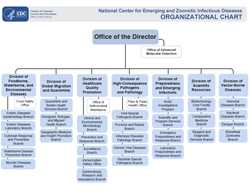Who We Are
The National Center for Emerging and Zoonotic Infectious Diseases
is committed to protecting people from domestic and global health threats, including
- Foodborne and waterborne illnesses
- Infections that spread in hospitals
- Infections that are resistant to antibiotics
- Deadly diseases like Ebola and anthrax
- Illnesses that affect immigrants, migrants, refugees, and travelers
- Diseases caused by contact with animals
- Diseases spread by mosquitoes, ticks, and fleas
About Our Name

Infectious diseases are illnesses caused by germs (such as bacteria, viruses, and fungi) that enter the body, multiply, and can cause an infection.
- Some infectious diseases are contagious (or communicable), that is, spread from one person to another.
- Other infectious diseases can be spread by germs carried in air, water, food, or soil. They can also be spread by vectors (like biting insects) or by animals.
Emerging means infections that have increased recently or are threatening to increase in the near future. These infections could be
- completely new (like Bourbon virus, which was recently discovered in Kansas, or MERS, Middle East Respiratory Syndrome).
- completely new to an area (like chikungunya in Florida).
- reappearing in an area (like dengue in south Florida and Texas).
- caused by bacteria that have become resistant to antibiotics, like MRSA (methicillin-resistant Staphylococcus aureus), C. difficile, or drug-resistant TB.
Zoonotic means a disease that is spread between animals and people; some examples include:
- Lyme disease (spread by ticks).
- Salmonella (spread by poultry).
- rabies (spread by mammals).
Director Profile

Rima Khabbaz, MD
Director, NCEZID
Acting CDC Deputy Director for Infectious Diseases and Director, Office of Infectious Diseases
- Page last reviewed: August 28, 2017
- Page last updated: August 28, 2017
- Content source:
Centers for Disease Control and Prevention
National Center for Emerging and Zoonotic Infectious Diseases (NCEZID)


 ShareCompartir
ShareCompartir
